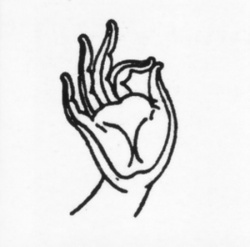Difference between revisions of "Vitarka Mudrā"
Jump to navigation
Jump to search
(Created page with "thumb|250px| <poem> Teaching Gesture Sjoquist p. 33 Vitarka Mudrā or Vyākhyāna Mudrā ānwèi yìn 安慰印 This gesture indic...") |
|||
| Line 1: | Line 1: | ||
[[File:VitarkaMudra.JPG|thumb|250px|]] | [[File:VitarkaMudra.JPG|thumb|250px|]] | ||
<poem> | <poem> | ||
| − | Teaching Gesture | + | [[Teaching Gesture]] |
| − | Sjoquist p. 33 Vitarka Mudrā or Vyākhyāna Mudrā | + | Sjoquist p. 33 [[Vitarka Mudrā]] or [[Vyākhyāna Mudrā]] |
| − | ānwèi yìn 安慰印 | + | [[ānwèi yìn]] [[安慰印]] |
| − | This gesture indicates teaching, intellectual argument, and debate. The thumb touching the index finger completes a circle of understanding, while the other fingers remain outstretched. (When Americans make this sign, they usually mean “okay.”) | + | This gesture indicates [[teaching]], [[intellectual]] argument, and [[debate]]. The thumb [[touching]] the index finger completes a circle of [[understanding]], while the other fingers remain outstretched. (When {{Wiki|Americans}} make this sign, they usually mean “okay.”) |
| − | Some important variants occur: if the thumb touches the middle finger, the gesture can mean compassion (so it is a gesture frequently seen in representations of Guānyīn); if it touches the ring finger, it can mean good fortune. | + | Some important variants occur: if the thumb touches the middle finger, the gesture can mean [[compassion]] (so it is a gesture frequently seen in {{Wiki|representations}} of [[Guānyīn]]); if it touches the ring finger, it can mean good [[fortune]]. |
</poem> | </poem> | ||
{{R}} | {{R}} | ||
Revision as of 13:16, 19 March 2014
Teaching Gesture
Sjoquist p. 33 Vitarka Mudrā or Vyākhyāna Mudrā
ānwèi yìn 安慰印
This gesture indicates teaching, intellectual argument, and debate. The thumb touching the index finger completes a circle of understanding, while the other fingers remain outstretched. (When Americans make this sign, they usually mean “okay.”)
Some important variants occur: if the thumb touches the middle finger, the gesture can mean compassion (so it is a gesture frequently seen in representations of Guānyīn); if it touches the ring finger, it can mean good fortune.
